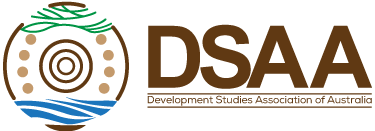Welcome to The DSAA monthly webinar series!
Development is a dynamic space, bringing together research and practice across a range of disciplines. Our webinar series explores this diversity, bringing a new speaker who shares their expertise on a critical theme of interest every month. Each session will explore diverse topics, from building a CV for the international development sector to conducting community-based research and decolonising research practices. Through these interactive webinars, we aim to support HDR and ECR students in expanding their networks, gaining real-world insights, and advancing their academic and professional journeys.
You can replay previous webinars from our YouTube Channel @DSA_Australia
UPCOMING WEBINAR
“First Nations Perspective: Stories of the Magic of Community-Based Research Practice, as Told by a Nanda Man“
How can Indigenous-led research teach us new ways of knowing, being, and working together?
We are delighted to announce our next DSAA webinar: ‘A First Nations Perspective: Stories of the Magic of Community-Based Research Practice, as Told by a Nanda Man’, presented by Dr Steven Kelly (La Trobe University) and moderated by Dr Deborah Cummins (institution/affiliation?).
Dr Kelly is a proud Nanda man from the Mid-West of Western Australia whose research bridges the worlds of community work and academia. As a Senior Lecturer in Aboriginal Studies, and long-time advocate for Indigenous-led research, he offers rich key insights into how research can serve as a tool for connection, empowerment, and cultural continuity, when grounded in respect for Country and community.
This webinar offers an engaging opportunity to hear directly from Dr Kelly about the transformative potential of community-based research viewed through an Indigenous lens. Drawing from his PhD journey and ongoing work with Nanda and Yamatji communities, Dr Kelly will discuss how Indigenous methodologies, rooted in Indigenous epistemology (ways of knowing), ontology (ways of being), and axiology (ways of doing), and a standpoint of cultural safety and respect, can foster research that is genuinely both accountable to, and co-created with, community.
Dr Kelly will explore how authentic voice, lived experience, and reciprocity can shape meaningful research outcomes, through methods like yarning and autoethnography. He will also share insights from Nanda Language Revitalisation projects, including the unique process of naming a new species of squat lobster in Language, and share reflections on the journey towards his recently published, first book, A First Nations Perspective: Stories of Nanda Resilience as Told by Nanda Elders.
Dr Steven Kelly is a proud Nanda man from the Murchison region in Western Australia’s Mid-West. He is a Senior Lecturer and Coordinator of Aboriginal Studies in the School of Social Inquiry at La Trobe University, with experience spanning NGOs, government, and academia. Dr Kelly completed his PhD at Curtin University in 2017, exploring his family’s deep connections to kin and Country, and later held a four-year Indigenous Postdoctoral Research Fellowship at the University of Melbourne. His work champions Indigenous-led, community-based research grounded in cultural respect and self-determination. He is the author of A First Nations Perspective: Stories of Nanda Resilience as Told by Nanda Elders, and continues to work closely with Nanda and Yamatji communities.
Dr Deborah Cummins is the Founder and Director of Bridging Peoples and serves on the Executive Committee of the Development Studies Association of Australia (DSAA) as Industry Representative. She holds a PhD in Local Governance from the University of New South Wales, and a Bachelor of Laws (Honours) and Bachelor of Arts (Honours) from the University of Melbourne. With over two decades of experience across NGOs, governments, and international agencies, her work focuses on community engagement, governance, women’s political participation, and postcolonial development. Combining her background in law and development, Dr Cummins supports organisations to build inclusive, grounded, and locally led approaches to community governance and civic engagement.
Date: 31st October 2025
Time: 6-7:00 pm AEDT
Location: Live YouTube Channel @DSA_Australia
For more information, you can check our website or subscribe to our YouTube Channel
Leave space here
This initiative aligns with the DSAA’s core objectives of engagement, research, and teaching, strongly emphasizing decolonizing research and connecting with Majority-World scholars.
